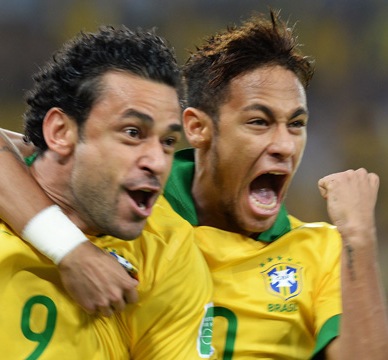FIFA: World Cup will be in 4K, and 8K
April 9, 2014
By Chris Forrester
 Football’s governing body FIFA says its upcoming World Cup tournament from Brazil will be carried by some broadcasters in 4K. Niclas Ericson, head of FIFA’s TV Division, speaking at MIPTV in Cannes, said FIFA was working 24/7 to capture the event, not only in HDTV, but also in 4K and even 8K.
Football’s governing body FIFA says its upcoming World Cup tournament from Brazil will be carried by some broadcasters in 4K. Niclas Ericson, head of FIFA’s TV Division, speaking at MIPTV in Cannes, said FIFA was working 24/7 to capture the event, not only in HDTV, but also in 4K and even 8K.
“We are working hard to finalise all the broadcasting arrangements, and I have to say that some contracts are not quite in place for certain aspects, but last week we confirmed that some of the matches will be in 4K. Football and the TV industry have worked hand in hand over the years, and fans now expect the very best from us,” he said. “Developments like the introduction of colour TV, and then HDTV, have been helped by our tournament.”
“In 2010, together with Sony, we brought 3D coverage to the world. Sony is our marketing partner, and to be clear, the business we do on the actual broadcasts is not part of the core agreement, but we are so happy to be able to work with Sony to stay in front of developments when it comes to coverage of our sport and to make sure that the games are projected around the world in the best state possible.”
Ericson explained that the Confederations Cup (in Brazil, June 2013) was something of a ‘dummy run’ at what might be included in the actual World Cup games. “The results were very promising, helped by shipping a truck from Europe (by Telegenic), and this helped us decide in favour of 4K for this June’s World Cup.”
Ericson showed the extremely challenging camera plans for the matches, and when 4K (and 8K) is included it means that some grounds would be hosting more than 60 cameras. “There are gaps in our 4K camera plan, but we are now working hard to see how some cameras can double as both 4K and HDTV units, and adapting their lenses to suit.”
Ericson said that three matches at the Maracana (Rio de Janeiro) stadium would be covered in 4K. Games 50, 58 and 64 (the final) would be televised. “These are three very key matches, but in any case it is made easier for us because the Maracana stadium is very large and where we have our FIFA headquarters for the whole series of games and where the broadcasting centre is based. The coverage is more than just the soccer and requires us to create special graphics, commentators, and a dedicated production team.”
“With NHK of Japan we are also working on 8K production. This will include a few matches but is a very different arrangement, with a handful of cameras – only a few exist. But it does mean that we can down-convert the 8K camera work to 4K, and make those images available for the 4K productions,” he added.
“We have had lots of discussions with our broadcasting clients, and looking at whether we can put the 4K signals onto a ‘world feed’ and if we were to do this who might take the signals, and what would we need in terms of fibre and satellite capacity to do this.”
Ericson explained that FIFA was still exploring how this might be achieved technically, and in the most cost-effective way which would enable broadcasters “if they wished, to take the material. Needless to say there are many Asian broadcasters willing to do this. It will be interesting for us to see how this works out, and discussions are taking place now to see how much interest there is. As well as this we will be making delayed images available should they wish to have them, and we will produce two movies of the events.
FIFA had structured the TV rights in such a way so as to make it as easy as possible for would-be 4K broadcasters to take the matches. If they want to cover the games then it is not about rights but simply about the technical aspects. “We are in discussions now with potential carriers of what we describe as a ‘world feed’ [in 4K] and we recognise that the industry is also struggling with whether to handle 30 fps or 60 fps, but we want to do the very best we can. We hope that there will be a few Asian broadcasters, and then in the Middle East as well as Europe, will take the 4K feed, as well as Globo in Brazil, and perhaps some cinema exhibition around the world.”
